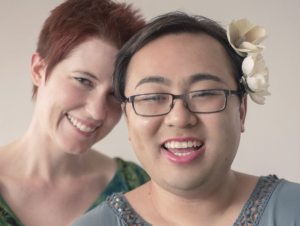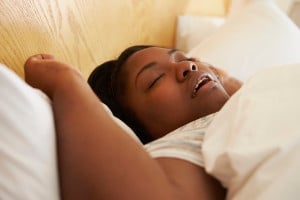
Source: Getty Images
Editor’s Note: This article is addressing how the notion of virginity is used to control women’s sexuality and determine their value. If someone chooses to not have sex for their own personal reasons, that’s fine too and we shouldn’t shame or judge them either.
Virginity.
It’s something we all know of, something we’ve all talked about. It’s something we, as a culture, obsess over.
It’s a very valuable thing to have, if you’re a woman, and a very perplexing thing to have if you’re a man.
Female virginity is valuable to society, but a man’s isn’t really worth anything; in fact, it’s better for a man’s social status if he is not a virgin.
And this ties into what is known as the sexual double standard: Women are shamed for having sex and men are rewarded for it.
The idea of your first penis-in-vagina sexual encounter being something significant and life altering (well, for women anyway) has origins in women being considered property.
That is to say, virginity is a social construction that came about because of the commodification of women.
Since women were (and sometimes still are) considered property, when they got married, they were passed on to their husbands from their fathers. You know the whole father-walks-his-daughter-down-the-aisle tradition? Well, it represents a transfer of property from her father to her husband. Her father was literally giving her away.
A woman’s sexual purity became very important because of this. Her virginity was seen as one of the most important things about her.
Sexuality was also, of course, also regulated by religion, which made sex shameful and taboo outside of marriage. And for the most part, contraception was unattainable, so it was important for women to remain virgins for their husbands to ensure the purity of his bloodline.
Basically, virginity served as the Medieval form of a paternity test.
But although virginity may seem like just a tradition, it’s actually very problematic and even harmful.
1. Virginity Is Sexist
Sure, in modern times, virginity as a concept exists for guys, too, but it doesn’t have nearly the same social implications or significance.
Women are taught that their virginity is valuable, even a commodity. If they “lose” it the wrong way – that is, with the wrong person or at the wrong time – then we label them as easy or even call them “damaged” or “desperate.”
Meanwhile, men don’t have to worry about being judged or shamed for “losing” their virginity.
In some cultures, women who aren’t virgins when they marry can be exiled or even killed, particularly for shaming their families.
Virginity is a sign of purity. And not being pure when you marry in many societies brings shame and dishonor to your family, even if you were raped.
Men who aren’t virgins when they marry? They don’t face those cultural consequences.
2. Virginity Contributes to Slut-Shaming
Virginity is constructed so that we judge women based on how and when they started having sex.
Losing your virginity at the wrong age (usually being “too young” in this case), at the wrong time (“too early” on in a relationship, or not during one at all), with the wrong person (usually someone you aren’t “in love” with) or with the wrong feelings (doing it for any other reason than loving your partner and wanting to pledge your love and devotion) has social consequences.
These factors are all subject to speculation and judgment by others, particularly by slut shaming.
Slut-shaming is when you place guilt and subordination on women for their sexuality. Women dressing in revealing clothing, having or being perceived to have slept with lots of people, or even just having a lot of friends who are men are common behaviors women are slut-shamed for.
This is problematic because slut-shaming is sexist and reinforces a sex-negative mindset, based on puritanical sexual values.
Slut-shaming doesn’t give women sexual autonomy, but instead constrains their behavior and choices by placing these expectations on to how they should go about being sexual (i.e., they shouldn’t).
And not losing your virginity in the culturally defined appropriate way can lead to being slut-shamed.
3. Virginity Frames a Woman’s Worth as Inversely Proportional to How Much Sex She’s Had
As stated, virginity is linked with purity.
This means that the more sex that you’ve had, the less pure you are.
What that translates to for women is that your value is inherently linked to how much sex you’ve had, specifically how much sex you’ve had with men.
There is an inverse relationship in how much sex you’ve had and how much society deems your worth to be.
For men, however, there’s a positive correlation between how much sex they have and the worth that society deems them to have.
Men are socially rewarded for having sex, and women are socially punished –he’s a stud, and she’s a slut.
This is what is known as the sexual double standard and virginity has a lot to do with its context.
4. Virginity Is Heteronormative
Virginity assumes that penis-in-vagina sex is somehow a special type of sex that is different from all others.
It’s assumed that unless you’ve had a penis in your vagina, or put your penis into a vagina, then you haven’t really had sex. Somehow, even oral and anal sex don’t really “count” in our culture, despite both having the word “sex” in them.
This means that there is an assumption that engaging in heterosexual vaginal sex is the standard (and should be) for your sexual activities.
Heterosexuality is the norm, and virginity just works as reinforcement to this.
Virginity erases the experiences of lesbian, gay, bisexual, queer and other non-heterosexual people – and the experiences of straight people who just don’t have PIV sex!
It paints their sex as somehow invalid and not as real as heterosexual sex.
Virginity assumes that you are heterosexual and doesn’t take into account the lived experiences of any other types of sexual expression.
5. Virginity Erases Queer and Trans Folk
Since virginity is stuck in a heteronormative box, it doesn’t leave room for those that don’t fall into the gender binary or other so-called “conventional” forms of sexuality.
Virginity is dependent upon being a heterosexual, cisgender man or woman and doesn’t have any sort of framework for relationships and people that fall outside of this.
These folks are often not considered to even have lost their virginity, unless they’ve had heterosexual sex with someone of the opposite sex.
Look no further than the Internet! There are pages upon pages of people questioning whether or not lesbians who’ve had sex are virgins.
The fact that this even matters to so many people obviously says something about how much we as a culture value virginity (way, way too much) and how we view virgins and non-virgins differently.
***
Because of how non-inclusive and sexist virginity is, using it is extremely problematic, as it contributes to these social problems.
By applying the concepts and values of virginity to your own and other’s sex lives, you are reinforcing patriarchal norms about sexuality and women’s worth.
The patriarchy wants you to commodify sexuality and hold sexist attitudes about it because that is how they can keep the status quo in tact.
By forcing sexuality to exist in this small, heteronormative, cissexist, heterosexist box, they can effectively erase the experiences of all people that don’t fit inside of that.
I don’t stand for that, and I bet you don’t either.
I ask you, then, to consider your feelings on virginity and start to question your own ideas about how sexuality is constructed.
The more critical you become about virginity, the more its cultural obligation will start to seem trivial and unappealing.
After all, social constructions are just based in how we tell ourselves the world is based on prior knowledge and experience.
But what would happen if that knowledge and experience changed?
That question is the key to losing virginity – for good.
[do_widget id=”text-101″]
Erin McKelle is an e-activist, video blogger, student, and non-profit advocate and has launched several projects including Fearless Feminism and Consent is Sexy. In her spare time, Erin enjoys reading, writing bad poetry, drawing, politics and reality TV. You can find her blogging at Fearless Feminism, Facts About Feminism, and Period Positive. Follow her on Twitter @ErinMckelle and read her articles here.
Search our 3000+ articles!
Read our articles about:
Our online racial justice training
Used by hundreds of universities, non-profits, and businesses.
Click to learn more




















